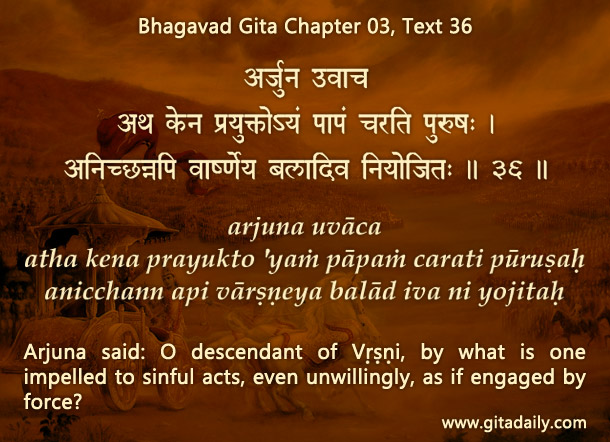We all have an inbuilt self-destruction button. For example, in sports such as cricket, an in-form batsman who is leading his team to a comfortable victory plays an unnecessary rash shot and gets out. The remaining batsmen collapse, and their team snatches defeat from the jaws of victory.
The compulsion for self-destruction leads to far more damaging consequences among addicts. The urge to drink distorts the behavior of alcoholics from responsible and reasonable to delusional and self-destructive. Even if they recognize the urge to be dangerous and resolve to resist it, still, they get overpowered by it, again and again.
Echoing the universal human anguish at such self-destruction, the Bhagavad-gita underscores this malevolent inner force (03.36) and identifies it to be lust, the self-centered desire for worldly gratification (03.37). It is present within our psyches as a consequence of our past indulgences, either in this or previous lives. Blinding us to our long-term interests, it impels us towards short-term pleasures, even at the cost of our integrity and sanity.
If we are to make any meaningful contribution, if we are to find lasting satisfaction, if we are to become what God wants us to become, we need liberation from this compulsion for self-destruction. And we need this liberation more than all other forms of liberation, be they political, racial or cultural.
To gain such liberation, Gita wisdom urges us to access higher happiness by practicing bhakti-yoga diligently. By such practice, we realize that we are eternal souls, parts of the all-attractive, all-blissful Supreme, Krishna, and gain access to spiritual happiness. By focusing on and relishing that happiness, we become absorbed in him.
When we are thus liberated into the higher happiness of loving service to Krishna, we become liberated from the lure of quick pleasure that compels us towards self-destruction.
To know more about this verse, please click on the image
Explanation of article:
Podcast:


KRISHNA BHAKTI leads one away from self destruction.
I am very new to Krishna consciousness. In my studies I have stumbled across your website and it seems like almost every lesson speaks to me personally. I thank you very much for your hard work and the wonderful lesson you provided here. Hare Krishna!
Thank you for your comment. Happy to know that my writings are of some service to you in your spiritual journey. Yes, the Gita has the capacity to speak to us where we are, and discovering that potential of the Gita can inspire an enduring love for this divine classic.